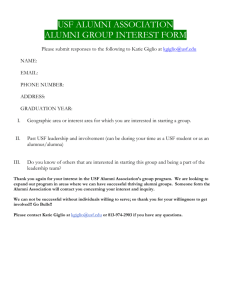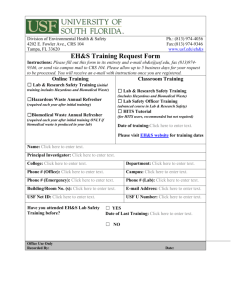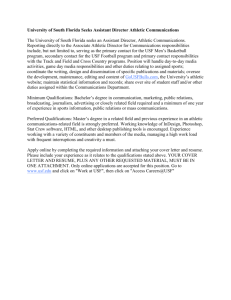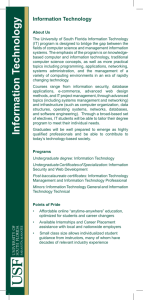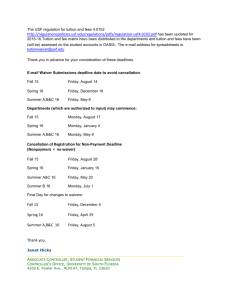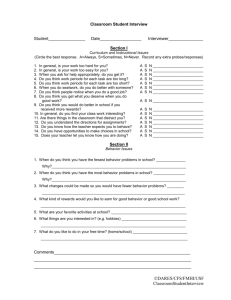To explore why students choose mass communication and the PR
advertisement
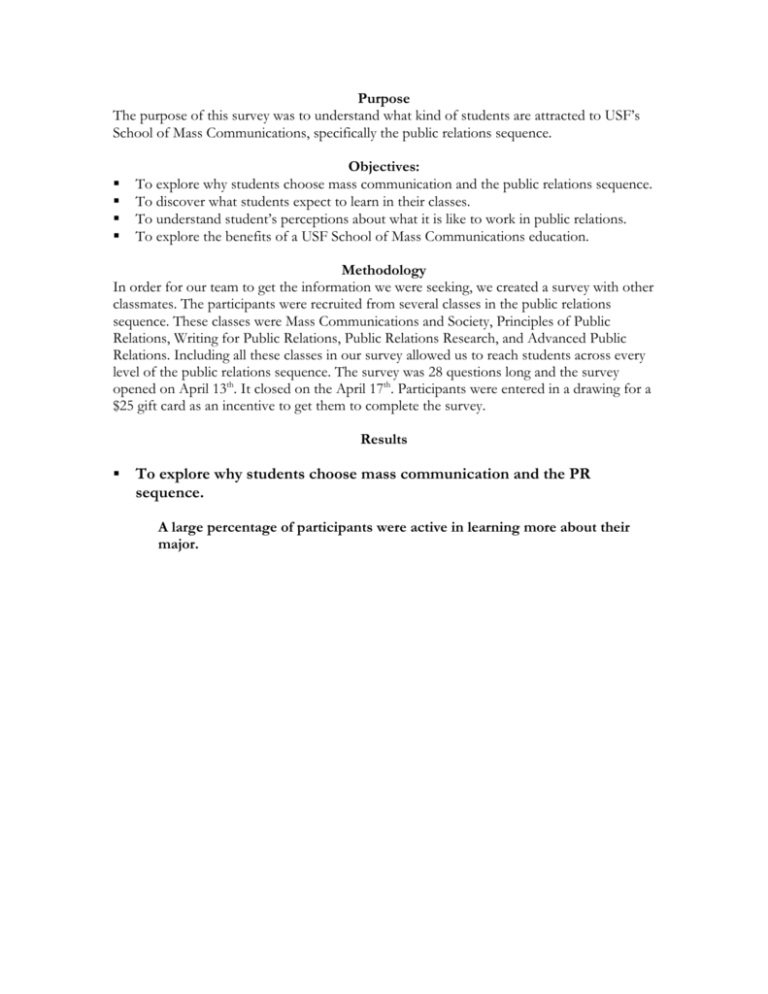
Purpose The purpose of this survey was to understand what kind of students are attracted to USF’s School of Mass Communications, specifically the public relations sequence. Objectives: To explore why students choose mass communication and the public relations sequence. To discover what students expect to learn in their classes. To understand student’s perceptions about what it is like to work in public relations. To explore the benefits of a USF School of Mass Communications education. Methodology In order for our team to get the information we were seeking, we created a survey with other classmates. The participants were recruited from several classes in the public relations sequence. These classes were Mass Communications and Society, Principles of Public Relations, Writing for Public Relations, Public Relations Research, and Advanced Public Relations. Including all these classes in our survey allowed us to reach students across every level of the public relations sequence. The survey was 28 questions long and the survey opened on April 13th. It closed on the April 17th. Participants were entered in a drawing for a $25 gift card as an incentive to get them to complete the survey. Results To explore why students choose mass communication and the PR sequence. A large percentage of participants were active in learning more about their major. Business and mass comm. were the most popular majors student’s were considering when the entered USF. There are many reasons to consider mass communications or to declare mass communications as your major. “I like the creative end of public relations and advertising. It allows you to have fun with your job and express yourself creatively.” “ I have enjoyed the world of Mass Communications ever since I was in television production in high school. I have enjoyed doing production, writing scripts for morning shows and doing many video projects for my old high school.” “I enjoy being creative and feel that Mass Communications incorporates the sort of things I want to be doing for the rest of my life.” When it came to majoring in mass communications, students brought up many concerns. “The difficulty of getting permits. The procedure for getting classes needs to seriously be revised. It makes being in mass communications extremely stressful.” “Yes, the lack of available positions. The competition is extremely fierce with several people with the same background, education, and professional skills applying for the same positions.” “I'm narrowed in the industry I want to work in and it appears that those in charge only hire women.” There were many students that found different ways to learn more about majoring in Public Relations. Many respondents (89.2%) used research and read about the field in order to learn more, while 76.9% of them talked to PR professionals. To discover what students expect to learn in their classes. Advanced Public Relation Writing for Public Relations Public Relations Design and Production Public Relations Research Public Relations Issues Principle of Public Relations Writing for Mass Media Introduction to Advertising Media Ethics Beginning Reporting NOT AT ALL BENEFICIAL (%) NOT VERY BENEFICIAL (%) SOMEWHAT BENEFICIAL (%) VERY BENEFICIAL (%) NOT SURE (%) MEAN (%) 0.0 1.8 0.0 82.1 16.1 3.96 0.0 00 7.0 80.7 12.3 3.92 1.8 00 10.7 73.2 14.3 3.81 0.0 1.8 14.5 74.5 9.1 3.80 3.5 7.0 17.5 64.9 7.0 3.55 3.4 3.4 29.3 60.3 3.4 3.52 1.8 12.3 22.8 61.4 1.8 3.46 00 10.3 43.1 34.5 12.1 3.27 1.9 1.8 11.1 15.8 33.3 40.1 35.2 42.1 18.5 0.0 3.25 3.23 Communications Law 1.8 8.8 49.1 24.6 In order to prepare students for a career in public relations, there are many aspects of their major that they should be learning in class. “I think we should learn all of the aspects of a public relations job. We should learn the different areas you can work in; how to write effectively; and how to use the design programs.” “As much as you can. Knowledge is power and it cannot hurt to know as much as you can about your profession, as well as the surround mass medias and fields. The more diverse knowledge you have, the more powerful you become.” “What truly is the art of public relations and what career options you can have with that degree. How to maximize their degree so they get the most use out of it.” Other than taking classes public relations there are other ways PR students can help prepare themselves for their careers. “Acquire at least two internships, join PRSSA, and obtain an mentor.” “An internship is a must. There is so much to learn hat each student should get out in the field prior to graduating to get some hands on experience. Also, get involved in student organizations that are geared towards public relations and build a network with your fellow students so when you have a question, you might be able to find it through your social group.” “Marketing classes, public speaking classes, internships, and shadowing professionals in the field, and blogging.” Being a PR professional, there are some important skills they need to have. 15.8 3.15 Writing (92.1%) and working with others (93.7%) seemed to be the most important skills a PR professional should have. Writing Working with Others Social Media Public Speaking Critical Thinking Design Research General Business Knowledge Computer Software Math/Statistics Very Unimportant (%) 1.6 Somewhat Unimportant (%) 0.0 Somewhat Important (%) 6.3 Very Important (%) 92.1 1.6 1.6 3.2 93.7 3.89 0.0 1.6 1.6 0.0 1.6 3.2 1.6 3.2 0.0 0.0 9.5 15.9 12.7 42.9 46.0 87.3 81.0 82.5 57.1 52.4 3.84 3.76 3.76 3.57 3.49 0.0 4.8 44.4 50.8 3.46 1.6 9.5 34.9 54.0 3.41 4.8 47.6 44.4 3.2 2.46 Mean 3.89 The majority of the respondents that took this survey were members of the Public Relations Student Society of America (PRSSA). Surprisingly, most students in this field have not yet had a PR internship or practicum, but they are planning on having one (54%). • To understand student’s perceptions about what it is like to work in PR The majority of students are very interested in working in the field of public relations; however, they are less interested in the possibility of getting a master’s degree in that topic. They would rather get a degree in another field. Working in the field of public Not at all Interested (%) 1.6 Not very Interested (%) 1.6 Somewhat Interested (%) 27.9 Very Interested (%) 68.9 Mean 3.64 relations? Getting a 17.7 33.9 25.8 22.6 2.53 master’s degree in a field other than public relations? Getting a 18.3 28.3 41.7 11.7 2.47 master’s degree in public relations? ‐ Many students believe that having a bachelor’s degree helps prepare them for the workforce, but they think it will be difficult to actually find a job in the PR field. Getting a master’s degree in the field isn’t necessary for getting a job in PR or advancing in positions. Having a bachelor’s degree in public relations will help me get a job in public relations I will need to get a master’s degree to move up the corporate ladder once I am working in public relations It will be easy for me to get a job in the public relations field I will need to get a master’s Strongly disagree (%) Somewhat agree (%) Somewhat agree (%) Strongly agree (%) Mean 5.4 Neither agree nor disagree (%) 5.4 0.0 39.3 50.0 4.34 5.5 30.9 23.6 29.1 10.9 3.20 8.9 37.5 26.8 25.0 1.8 2.73 23.2 32.1 28.6 8.9 7.1 2.55 degree to get a job in the public relations field ‐ ‐ Student’s believe the average starting salary for a PR graduate ranges from $20,000-$40,000 ‐ ‐ Students are willing to work for less than the average salary in order to gain experience in the field. ‐ ‐ There are a variety of specialized PR fields that students want to work in. The most popular specialized areas are in entertainment, firms, and event planning. ‐ Students feel that they are somewhat prepared for entering the PR job market. To explore the benefits of a USF School of Mass Communications education. ‐ Most students weren’t very knowledgeable about USF’s Mass Communications program. ‐ The main ways students heard about the USF School of Mass Communications through the actual USF Web site and through friends. ‐ Many students aren’t sure how USF’s PR program ranks against programs at other Florida universities, but other students feel that USF’s program is above average. ‐ ‐ The majority of the students (52.5%) are somewhat satisfied with their experience in the School of Mass Communication. Demographics The majority of participants were female. The majority of participants were mass communications majors. The majority of the participants were seniors. The seniors represented 60% of participants while juniors made up the second largest group (36.7%) The majority of participants were 21 or 22 Summary The purpose of this survey is to understand what kind of students are attracted the public relations sequence at USF’s School of Mass Communications. Mass communications was the most popular response to what majors students were considering when they entered USF. Other popular answers were business, education and psychology. Most participants felt that the classes that they were taking were beneficial to them. They felt that the skills of working with others and social media were the most important skills to possess as a public relations professional. Most of the participants did various things to be more informed about there major. Participants researched and read about public relations. They also joined the student organization PRSSA and talked to professionals. More than half of the participants did not have an internship or practicum but did anticipate having one in the future. Participant’s most popular answer when asked what they think their starting salary was between $20,001-30,000. Entertainment was the most popular answer when participants were asked what fields they were interested in working. Other popular answers were public relations firm and event planning. Large portions of participants were not very knowledgeable about the USF School of Mass Communications before they enrolled at USF. Half of the participants heard about the School of Mass Communications from USF’s Web site. Most of the participants did not know enough about other schools public relations sequences to compare them USF’s. More than half of the participants were somewhat satisfied with the School of Mass Communications and felt that they were somewhat prepared to enter the public relations job market. There are some ways to improve the campaign. Some choices in the survey were not completely clear to participants and did have some awkward wording. There should also be a way for participants to give comments or suggestions about the survey and its effectiveness. To attract students to the public relations field there should be more information about the benefits of the field. As for USF’s public relations sequence, the school site should be updated and more attractive and there should be more outreach by professors, administrators and student organizations to students who are undecided on the major


